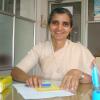Horizons - I always love the Scripture readings during the first week of Easter, when the church prays with the appearance stories of the resurrected Jesus. What I especially appreciate is the human reality.
Members of the Confederation of Latin American and Caribbean Religious see this moment in the church as a celebration brought to a halt by a crisis, calling women to assume leadership and pave the way for a transformation. The Commission for the Protection of Minors, which first met in November in Bogotá, Colombia, established protocols for responding to victims who come forward that each member country's religious conference can adapt to their own local civil laws.
Mumbai, India - With the help of volunteers from Our Lady of Health Parish, Minor Carmelites of Charity sisters manage the Marian House of Charity, which serves 29 residents with mental and physical disabilities in the suburb of Versova. "Our children are abandoned by relatives who found it difficult to take care of them. We give them a home and treat them as part of our family."
Notes from the Field - As full-time volunteers, we are going to struggle to define what we need, what success or failure looks like, to define when we are overindulging in self-care.
From Where I Stand: No doubt about it: The seventh degree of humility in the Rule of Benedict was meant for us. It's impossible, of course, to lead the world in everything. But tell any lie long enough and people are prone to believe it. And claim it. And assume it. And we do.
As I enjoyed Kalyani Nagar Joggers Park, there was a wonderful interplay of words of prayer like Rabindranath Tagore's poem and reading from the primordial sacred book called nature.
We hear so much about the caravans coming from Honduras that I wanted to see what would make people flee from their country. The control of the land and rivers by the wealthy and their corporate interests has created an environment of social instability and forced the expulsion of the people.
Sr. Jean Bellini of the Sisters of St. Joseph of Rochester, New York, has lived in Brazil since 1976. She is one of the three coordinators of the Comissão Pastoral da Terra (Pastoral Land Commission), a Catholic organization that supports peasants and landless people. She works in the state of Pará in the Brazilian portion of the Amazon basin.
Margaret Farrell is a member of the Religious Sisters of Charity, originally from County Cork in Ireland. She has ministered in Ireland and England as a prison chaplain, in a domestic violence shelter and in outreach to the homeless. For the past 20 years she has been living and working in California, and is currently working as the spiritual ministry coordinator at Covenant House California.
Recalling Jesus' death on the cross, Pope Francis led thousands on Good Friday in reflecting on the crosses of loneliness, fear and betrayal that crucify countless men, women and children in the world. In the annual Way of the Cross in Rome's Colosseum April 19, the meditation for each station reflected the suffering and pain of people exploited and marginalized.







